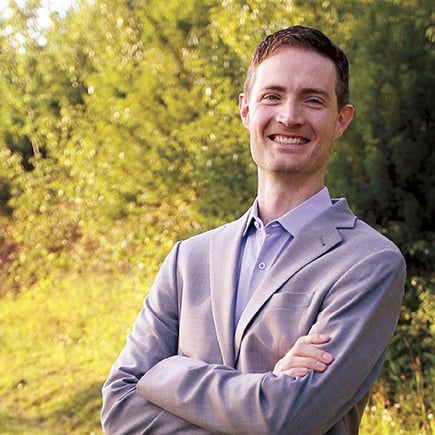Business in 2023 is different. Sure, there are still the traditional paths. Some farmers still work hard to identify a market and then chart a methodical approach to launch a business into it. Others take up the mantle from their parents, as young farmers always have, finding ways as they do to add their own signature to it.
These days, though, there’s a third option, which is to leverage the power of social media.
If the thought makes you roll your eyes and mutter something like “that’s not real business,” you can be forgiven. Andy Pasztor would have done the same thing. At least, he would have done it until he experienced social media’s business potential up close.
Read Also

Sibling squeeze part 6: The emotional stakes of a family legacy
The final instalment in a six-part series exploring the challenges of sibling conflict and the effect it can have on…
Pasztor is an affable farmer stationed near Tillsonburg, Ont., where he happily grows soybeans and a host of vegetables including peppers and cucumbers. He also happens to love a clean piece of equipment. In fact, he has considered the shine on his ag vehicles as a kind of calling card — and he has plenty of pictures to back that up. He regularly posts his clean machines on Twitter and constantly interacts with his 34,000 followers.
“I like going on Twitter because I like talking farming,” says Pasztor, 40. “I really like seeing pictures of equipment. Some guys farm because they like growing crops, I like farming because I like the equipment. I love tractors and combines. It’s just so cool.”
That’s how Pasztor, a family-first farmer, stumbled into his second company. It was all thanks to a joke between friends on Twitter, the biggest virtual coffee row for North American farmers.
Years ago in 2014, Rob Reese, a Twitter pal of Pasztor’s who farms in Michigan, replied to a tweet by stamping #andyclean on a picture of yet another sterling piece of machinery. It was a light tease, a way of saying Pasztor’s obsession had created a new kind of gold standard for machinery. Now, a tractor could be Andy clean.
Not that anyone knew it at the time, but the silly joke between friends was the beginning of Pasztor’s eventual soap business, Andy Clean. Call it the tweet that launched a thousand sales.
Long before the soap business ever blossomed, though, the #andyclean hashtag made the rounds and, without quite knowing it, Pasztor himself was turning into a brand, similar to Quick Dick McDick or SharkFarmer — before a single jug of soap was ever sold.
The down-to-earth Pasztor is quite pleased with how the story has unfolded since then. He has never relied on the soap business to feed his family or pay the mortgage. Instead, he measures his success in terms of positive experiences. Financial statements take a back seat to genuine relationships.
“The soap is secondary, it truly is. The people we get to meet and connections we make, it’s priceless. You can’t put a number on that. It’s not just about money,” Pasztor says.
“We don’t want to be just business partners. This is a friendship.”
That alone has set him apart from just about everybody running a secondary business venture. He didn’t expect success initially so he doesn’t expect success in the future — despite the fact that the product is popular and Pasztor himself has achieved celebrity status in much of the ag world.

What he has already received from Andy Clean — countless road trips, ag retail demos and simply meeting more people in rural North America, is a payback he can’t put into dollars, but which, for him, delivers a steady injection of value.
So, how did “the people’s soap” get to where it is today on store shelves at hundreds of ag retails across Canada and the U.S.? Good question.
Gettin’ dirty
Prior to Reese’s tweet, Pasztor had regularly cleaned his equipment and kept it showroom clean as best he could. He’d done this before Twitter, too, but definitely took advantage of sharing pictures online once the medium came available.
Then, in the summer of 2018, his non-stop hashtagging and all his clean equipment shots caught the attention of John Deere’s social media team. The company sent Pasztor a box of cleaning supplies, towels and other handy tools and a card thanking him for keeping his equipment clean. Pasztor was gobsmacked with gratitude.
Pasztor continued his neat freak hobby, except now, other farmers were regularly chiming in with the #andyclean hashtag as well, and unbeknownst to him, John Deere sent him another box just a couple of months later. This time, though, Deere had designed an Andy Clean logo, printed 1,000 stickers, and encouraged him to slap them on his equipment or send to friends.

“I never said, ‘Hey, why don’t you design me a logo.’ This was all just a surprise. I was blown away. I couldn’t believe it.’ Every time they ship me something, it’s like, wow, this is unbelievable. We’re not buying brand new equipment, half our equipment’s red.”
Pasztor spent that winter mailing letters to Twitter friends with the stickers he received. Then, the whole thing took a turn from a funny hashtag to a is-there-a-business-here moment.
It happened when John Deere debuted its X-9 combine in summer 2020. They tweeted a photo of the million-dollar machine with an #XtraClean hashtag and a very visible Andy Clean sticker above the rear wheel.
“That’s when things started getting crazy,” Pasztor says.
He spoke to a friend in the industry who let him know he was sitting on a real business opportunity and told Pasztor in no uncertain terms that #andyclean had serious potential written all over it.
Knowing that the #andyclean, or Andy Clean, moniker had real clout, Pasztor decided to file a trademark application in both Canada and the U.S. on the company name and logo. Still without a sale to his name, Pasztor was now in debt.
“I thought holy s—, what have we done? I’ve wasted $10,000. Farming is good, but not that good. That was a little nerve-racking. I spent a lot of money that I was not in a position to be spending,” he says, noting that he initially didn’t tell his wife what the final bill read. As he explains: “10 grand is 10 grand.”
He approached John Deere to partner with him on it since the company created his logo and in effect help generate some of the momentum of the business. Deere declined and Pasztor experienced his first setback.
“Nothing came of it. At the time I was kind of bummed out, but it was the best thing that ever happened to me,” he says of the rejection. He switched to Plan B, which involved calling on retailers who might be interested. “We never thought in a million years we’d be doing this. It couldn’t have worked out better.”
You might also say that when his Deere family didn’t want to partner, he turned to his dear family, specifically his two cousins Austin and Matt. Together, the brothers have backgrounds in accounting, finance and business, and Matt, based in Cambridge, Ont., and Austin in Charlottesville, Va., had several meetings with Pasztor throughout 2021.

As the three of them began to put meat on the bones of the business, Pasztor also secured a meeting with a prominent Canadian soap manufacturer in the summer in his search for the expertise to produce the soap.
In business his entire adult life, Matt was blown away when the soap company’s CEO sat down in the initial meeting.
“It could be two or three meetings before you could meet someone who could make a decision,” says Matt. “To have a decision-maker in the very first meeting, I said, ‘Andy, it proves that you have something.’”
By this point, Pasztor had a hunch this was the case, figuring if he could get a meeting, the rest would probably fall into place.
“My dad’s been a seed dealer for 40 years. I know how businesses run,” says Pasztor, who studied marketing after high school. “I didn’t really learn much in college other than it’s more people skills; that’s what I like, talking to people.”
Securing a deal almost immediately shocked Pasztor’s cousins who, by that point, realized the power of social media and how Pasztor himself was a brand, able to leverage himself.
“It’s pretty surreal to me, I haven’t been part of anything like that,” admits Matt. “This product in particular, if you can have a strong brand you can really go far, and that was kind of our game plan. I don’t know too many companies that started brands first.”
Soon after the deal was signed in mid-September, the soap manufacturer began to create the product while at the same time Pasztor began harvest.
However, life caught up to the farmer in many ways outside the soap. In short order, his wife announced she was pregnant with their third, his grandmother died and machinery was breaking down. Beyond that, John Deere went on strike, which seemed a critical theoretical blow to Pasztor who planned to — and ultimately did — sell his soap through the company’s many retail partners.
“The business gave me a bit of anxiety. I’ve never done anything like this in my entire life. I woke up one morning and my anxiety was lit. I wasn’t in the right frame of mind. All through harvest I was 100 per cent out of my comfort zone. It made me really think about this.”
Pasztor took a necessary and deliberate moment to make a critical choice. He would hold off on everything soap-related until the New Year. It didn’t really solve his business challenges, but at least the decision was made.
“There’s no sense bugging guys, we’re just going to piss them off,” he explains. “So we slowed it down.”
The winter reset let Pasztor catch his breath and start 2022 with a bang. Pasztor hatched a plan to do what he does best, talk farming and soap with interested agri-retailers.
Over seven days in late March, he and his father visited eight different ag retail companies in five states. He knew all the retailers’ key personnel through Twitter interactions. Meeting after meeting, Pasztor went into supreme detail about the product, and often test washed equipment to show the before-and-after power of the soap. Despite the planning and many meetings, Pasztor is insistent he had no numbers in mind and even joked it was just more of a Tommy Boy scenario where anything more than zero was a success.
“It was more of just let’s go on a road trip. Let’s have some fun. Let’s see some country and maybe we’ll sell some soap, right?”
At Landmark Implement in Nebraska, Pasztor knew the company’s marketing manager Jessica Randles. He’d been amazed by her Veterans Day combine flag wrap designs and he’d started talking to her about creating the label for the Andy Clean soap jug. Normally, extra work on top of her day job is a no-go, but it was different with Pasztor.
“Honestly, my answer is usually no, I do it all day, so I usually don’t want to go home and do it at night, but I really like Andy’s principles and values,” Randles says.
By the time they met in person, it felt more like friends getting together to chat and less of a formal pitch.
Randles said that since Landmark listed the soap, they’ve had farmers come from near and far just to get their hands on a jug at one of the retail’s 15 locations.

Landmark also holds a special place in Pasztor’s heart because of the company’s initial order. Earlier, a different soap manufacturer told Pasztor he’d never get big sales right off the hop because he was just too new in a marketplace that was already crowded.
“They said you’re not going to sell a dealership a full truck. Well, we sold them a whole full truck of soap. That’s 400 jugs and we did it right off the bat,” says Pasztor. “It surprised the hell out of me.”
Upon his return home, he had signed up six of the eight retails, which represented about 160 locations. Today, his total reach has swelled to around 350 locations representing 20-plus John Deere affiliates around North America.
Now, Pasztor is slowly and successfully expanding the soap into Western Canada. He recently inked a deal with 18 Pattison Agriculture retail locations, mostly in Saskatchewan.
A heat map of dealers on his website shows a powerbase in the northeast quadrant of North America, but it has rapidly fanned out and goes as far west as Idaho and Montana.
They all say the same thing. The soap has merit, but it’s Pasztor they’re after. Justin Englehart is the corporate parts manager Huron Tractor in Exeter, Ont., where Pasztor is a customer. The second Pasztor tweeted about launching a soap business, Englehart contacted him to get the soap into his 11 locations.
“He was very popular on Twitter and I knew it was going to be something that sold,” he says.
“The power of Twitter is pretty insane. As soon as I saw it coming up on Twitter, I knew it was just going to spread like wildfire. If I didn’t hop on it right away then we would have missed the bus and everybody else would have had it before us.”
When you can get left behind, the ride, if you catch the social media wave, can be “incredible,” Engelhart says. “It’s a great marketing tool.”
So far, there have been many repeat sales and Englehart hears nothing but positive feedback about it from customers.
Good clean fun
Even though the gag that got it going is eight years old, the #andyclean business is just cresting into its second full year. For Pasztor, it has already exceeded expectations, even though he did not have a specific number that set out to achieve.
“That’s a tough thing to really even put a number on because it’s a new product and we’ve got no advertising costs,” he says. “It’s all just built from social media so it’s more like an experiment to see where it can go, because that’s how I based all of my decisions, they were from Twitter.”

If it sounds as though Pasztor is a bit cavalier with his mindset, it’s only because he’s hardly the one to thank for the brand and product success to date. That praise belongs to those who tweet using #andyclean and keep the momentum going.
“I wouldn’t have done it if it wasn’t for everybody else who jumped in on the hashtag,” he says. “Those are the ones who I credit … If they tweeted a picture and it included the #andyclean hashtag, they’re the ones that helped build the brand.”
As he moves into the second year of his business, Pazstor is coy, but reveals part of the plan is to expand product lines. Currently, almost all of his customers are farmers, but there’s “a heck of a lot of big trucks that need to be cleaned.”
Part of that growth may include a larger advertising budget — currently it’s just Pasztor tapping away on his iPhone and his presence at farm show or retails — and, if you can believe it, giving the Twitter app a rest.
Although the platform got him to where he is today, it may require a different strategy to keep climbing.
“It’s like a good song when they overplay it on the radio; well, you get sick of it. So that’s going to be the challenge, how to keep it interesting on social media. One of the strategies is to just not tweet too much about it,” he says.
Whatever the second year brings, Pasztor is intent on riding the wave and keeping the fun going. After all, he’s in way over his head with good, clean fun.
“If it ends tomorrow, I don’t regret it at all and I won’t be upset because the main thing is I just wanted to try and see where it went,” he says. “I wanted to show my daughters, because they’re young, that if you’re passionate about something, and you really like it, you at least have to try, and who knows where it’s going to go.”
















